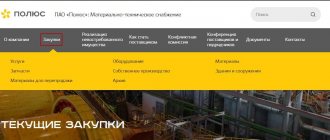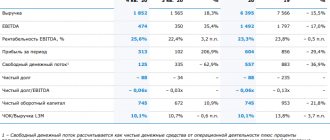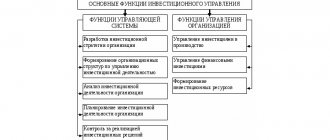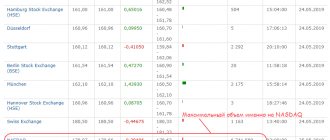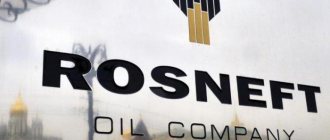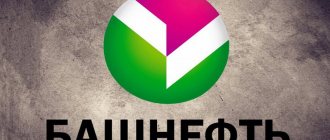A little history
Public joint stock company NK Rosneft is an enterprise for the extraction and processing of “black gold” and gas. Its predecessor, Rosneftegaz, was formed in 1991 to replace the USSR Ministry of Oil and Gas Industry. In 1993, it was transformed into the state enterprise Rosneft, which in 1995 acquired the status of a joint stock company. Rosneftegaz is part of it; it is the shareholder who owns the controlling stake.
In the early 2000s, the board of the company set the following goals:
- tightening control over assets;
- debt reduction;
- registration of licenses for the implementation of projects in Siberia.
The organization received assistance from the Government, which allowed it to increase its role in the national economy.
In 2002, it joined Rosneft, and in 2003 it acquired Severnaya Neft.
At the beginning of 2009, Russia, represented by Rosneft, and China, represented by CNPC, signed several supply contracts for a 20-year period, as well as the construction of a new branch of the Eastern Oil Pipeline towards China.
At the end of 2010, the heads of Russia and Venezuela ratified an agreement under which Rosneft acquired securities of the German well company Ruhr Oel, which were 50% owned by the Venezuelan PDVSA. This was the beginning of cooperation between domestic and Venezuelan oil production organizations.
In 2012, Rosneft bought the Murmansk fuel oil terminal from the United Shipbuilding Corporation to carry out developments in the Arctic. At the beginning of 2013, Rosneft acquired its competitor, the TNK-BP refining enterprise. As a result of this merger, Rosneft became the leader in the extraction and processing of “black gold” around the globe.
In 2014, due to the establishment of a restrictive regime against Russia, Rosneft came under sanctions. The president of the enterprise, Igor Sechin, addressed the Government with a request for the allocation of 1.5 trillion rubles in the form of financial assistance.
In 2021, a deal was finalized in which 19.5% of Rosneft securities were sold to the trading firm Glencore and a Qatari investment fund. The purpose of this operation was to replenish the budget of the enterprise in which a gap was discovered. The assets were subsequently acquired by QHG Oil Ventures Pte. Ltd (Singapore).
Heads of the corporation
Rosneft is a state-owned company that was founded in 1993, until 2010 it was alternately headed by: Alexander Putilov, Yuri Bespalov and Sergei Bogdanchikov. In 2010, the latter was replaced by Eduard Khudaitanov, who served as the head of the company for less than two years.
In 2012, Igor Sechin was appointed president of Rosneft, who now, in 2021, heads the corporation.
Before Igor Sechin assumed the position of president of Rosneft, since 2004 he headed the board of directors, while simultaneously working in the administration of the President of the Russian Federation. After 7 years, he had to leave the company due to a new decree regarding relevant officials who had to leave their posts in state-owned companies. In 2012, Sechin again had the opportunity to return to the corporation, where he already became its president and joined the new board of directors of Rosneft.
During his entire tenure, the current head of Rosneft has greatly contributed to the development of the company, making it larger and more successful. Thanks to him, it was possible to conclude the most large-scale transactions, one of which was the acquisition of 100% of the shares of the British TNK-BP. Thus, the takeover of a previously very large oil company in Russia took place.
Igor Sechin is considered one of the most influential people in the country, according to many, second only to the President of the Russian Federation. During his reign, several joint ventures and projects were created with other successful companies that have a positive impact on the development of the corporation.
Some are helping to increase oil production, and in September of this year another agreement was signed with Lamor Corporation, which produces machinery and equipment for oil spill response. The agreement between the companies will contribute to the production of innovative products that will ensure safety during the implementation of launch vehicle projects.
Not long ago, information appeared that by the end of 2021 a new development strategy for the oil company should be developed. According to Igor Sechin, it will have to contribute to increased competitiveness for the long term. In addition, there should be an increase in the level of annual oil production by 30 million tons and the creation of additional capitalization by 25-30% relative to the market value of Rosneft at the moment.
Holders of securities and members of the Management Board of Rosneft PJSC
So, who owns the enterprise and who is at the head of the corporation today. The list of shareholders of PJSC NK Rosneft (information as of 03/01/2019) can be presented in the form of a table:
| Shareholders | Shareholding, % |
| JSC Rosneftegaz | 50 |
| BP Russian Investments Limited | 19,75 |
| QHG Oil Investments LLC | 18,93 |
| JSC National Settlement Depository | 10,4 |
| Other enterprises and organizations | 0,58 |
| Federal Agency for State Administration property (on behalf of the Russian Federation) | 0,01 |
| Citizens | 0,34 |
| Unidentified persons | less than 0.01 |
Board of Directors
| No. | A person |
| Chairman of the board | |
| 1 | G. Schroeder |
| Chief executive officer | |
| 2 | I. Sechin |
| Vice-chairman | |
| 3 | M. Warning |
| Independent directors | |
| 4 | H. Rudloff |
| 5 | O. Vyugin |
| Council Members | |
| 6 | R. Dudley |
| 7 | A. Belousov |
| 8 | G. Quintero |
| 9 | A. Novak |
| 10 | A. Glasenberg |
| 11 | F. Alsuwaidi |
Management Board of PJSC NK Rosneft
| No. | A person |
| Chairman | |
| 1 | I. Sechin |
| Vice-chairman | |
| 2 | Yu. Kalinin |
| Vice Presidents | |
| 3 | E. Liron |
| 4 | G. Bukaev (internal audit) |
| 5 | D. Casimiro (processing, commerce and logistics) |
| 6 | P. Lazarev (finance) |
| 7 | R. Sharipov |
| 8 | Yu. Narushevich (internal service) |
| 9 | Z. Runier (projects) |
| 10 | O. Feoktistov (security) |
| 11 | A. Shishkin (innovations) |
I suggest you watch the thematic video “Interesting facts about Rosneft”:
Management Board and Board of Directors
According to information for 2021, members of the Rosneft board are:
- Igor Sechin as Chief Executive Officer;
- Yuri Kalinin;
- Eric Maurice Liron;
- Gennady Bukaev;
- Didier Casimiro;
- Pyotr Lazarev;
- Yuri Narushevich;
- Zeljko Runje;
- Yuri Kurilin;
- Andrey Shishkin;
- Vice President of RN Vlad Rusakova.
The composition of the board of directors of a Russian oil company is elected at a general meeting of shareholders.
In June of this year, a new composition was elected, it included:
- Assistant to the President of the Russian Federation and Chairman of the Council Andrei Belousov;
- Chairman of the Board and President of Rosneft Igor Sechin;
- Honored Economist Oleg Vyugin;
- representative of the US oil company Exxon Mobil Donald Humphreys;
- Managing Director of the Swiss company NordStream Matthias Warning;
- representatives of British BP: Robert Dudley and Guillermo Quintero.
Following a deal at the end of 2021 involving the sale of a 19.5% stake, two new participants from Glencore and the Qatar Investment Fund have been added to the list: Ivan Glasenberg and Faizal Alsuwaidi.
Previously, there were nine people on the Rosneft board of directors, but this year the number should increase to 11. The decision should be approved on September 29. In addition, other changes may occur. An influential German politician and ex-Chancellor of Germany, Gerhard Schröder, was offered to become an independent director at Rosneft. Most likely, the consortium's sale of most of its shares will also lead to changes.
At the moment, the independent directors are: Matthias Warning, Oleg Vyugin and Donald Humphreys. According to the corporate governance code, they must occupy a third of the seats on the board. Since it is planned to increase the composition to 11 people, there is a need to introduce another independent director.
About persons
Igor Sechin:
Born 1960
Graduated from the Faculty of Philology of Leningrad University
Since 1991 - Chairman of the Committee for the Development of External Relations of St. Petersburg
Since 2012 - President of Rosneft.
We can say that he is the owner of Rosneft - he owns the largest number of shares.
Thanks to Sechin, the most significant transactions took place, joint projects were created with other large enterprises. While at the head of the Management Board, Sechin contributed to the development of Rosneft, increasing its size, profit growth and success.
What will Rosneft do with its own shares?
Quasi-Treasury shares may be held without time restrictions, but large quasi-Treasury holdings are considered inconsistent with best corporate governance practices.
For example, Gazprom held a quasi-treasury 6.6% stake for several years and sold it to outside investors in 2021. Read on RBC Pro
The first trillionaires: who is breathing down the backs of Elon Musk and Jeff Bezos How Airbnb found a new source of income in a world without tourism Why it has become unfashionable to be a leader You won’t get off with dismissal: for which the CFO faces prison
Rosneft may subsequently sell them back to Rosneftegaz or another buyer, says RusEnergy partner Mikhail Krutikhin. Or pay them off, and then Rosneftegaz’s share will be partially restored, Krutikhin argues.
Rosneft spokesman Mikhail Leontyev told Bloomberg that Rosneft shareholders will decide what to do with them.
Last changes
The consideration of court case No. A08-12243/2018 dated December 7, 2018 in the appellate instance has begun. Organization in the role of another person, the amount of claims is 3,717,945 rubles.
The consideration of court case No. A08-12241/2018 dated December 7, 2018 in the appellate instance has begun. Organization in the role of another person, the amount of claims is 3,864,712 rubles.
The consideration of court case No. A50-23228/2018 dated July 20, 2018 in the appellate instance has been completed. Organization in the role of another person, the amount of claims is 751,414,048 rubles.
The consideration of court case No. A08-12244/2018 dated December 7, 2018 in the appellate instance has been completed. Organization in the role of another person, the amount of claims is RUB 2,495,747.
The consideration of court case No. A08-51/2019 dated January 10, 2019 in the appellate instance has been completed. Organization in the role of another person, the amount of claims is 605,605 rubles.
The consideration of court case No. A56-100482/2017 dated November 28, 2017 in the first instance has been completed. Organization in the role of another person, the amount of claims is 2,687,089 rubles.
What will happen to sanctions against Rosneft structures?
Since the “toxic” Venezuelan business has been transferred to another Russian state-owned company, it may fall under American sanctions, says Maximilian Hess, an analyst at the consulting company AKE Group. However, if this happens to Rosneftegaz, it will own less than 50% of Rosneft shares, which means that according to the US Treasury’s “50% rule,” Rosneft will not be subject to sanctions, he says.
Rosneft claims that it has sold its Venezuelan business to the Russian government, and now has the right to expect the lifting of US sanctions on the company's two trading subsidiaries - Rosneft Trading and TNK Trading International. “We have fulfilled our obligations and now have the right to expect the fulfillment of publicly given promises from American regulators,” Leontyev told RIA Novosti. Previously, the US Treasury promised to lift sanctions against Rosneft structures if they take “concrete, meaningful and verifiable steps to support the democratic order in Venezuela.”
Sberbank and Rosneft cancel subscription fees for shareholders
From October 1, it will be possible to own shares in Sberbank and Rosneft without a subscription fee. Responding to the dissatisfaction of participants in the “people's IPO,” Sberbank is canceling the commission for the deposit of Rosneft shares and its shares, the Kommersant newspaper reports. The state and its companies, which are trying to build “people's capitalism” in Russia by involving citizens as their shareholders, are forced to meet the wishes of minority shareholders. Rosneft For the first time, the discontent of citizens who responded to the all-Russian call to become shareholders of state-owned companies became known in the summer. This dissatisfaction spilled out at the annual meeting of Rosneft shareholders, which took place on June 30 and was held for the first time with the participation of about 900 new minority shareholders.
As Kommersant writes, it turned out that the dividends accrued at the end of 2006 (RUB 1.33 per share) are not only lower than the amount that a minority shareholder would have received instead of purchasing Rosneft shares by putting the money on a bank deposit, but they don’t even cover the costs of paying for the storage of shares.
Minority shareholders were not satisfied with any explanations from Rosneft management, and as a result, Deputy Head of the Presidential Administration Igor Sechin promised to improve work with private shareholders, after which the All-Russian Regional Development Bank, controlled by Rosneft, reduced the commission for accounting and storage of company shares for individuals.
Sberbank and VTB
Since Rosneft is the most experienced participant in the “people’s IPO”—a year has already passed since the placement—the other state-owned companies with public participation—Sberbank and VTB—are closely monitoring its experience. Fearing discontent, Sberbank was the first to completely cancel the fee for storing shares, both its own and Rosneft’s (most of the public shareholders of Rosneft keep securities on deposit with Sberbank).
Previously, registering and storing Rosneft shares in a bank cost 0.08% per annum of the market value of the securities, but not less than 50 rubles. per month; storage of your shares - at least 50 rubles. per month or 0.02% per annum. From October 1, this commission, according to the deputy chairman of the board of Sberbank Bella Zlatkis, should remain with VTB shareholders for now. VTB 24 charges individuals who purchased VTB shares during the IPO a fee for storing shares in the depository in the amount of 0.02% per annum, but not less than $2 per month. According to the Vedomosti newspaper, in total, its retail subsidiary will earn $3 million from storing VTB shares. Plans to reduce or cancel the fee have not yet been announced.
State However, it can be assumed that VTB, as the most “people’s” of all three companies, will also take this step. The “People’s IPO” is intended to show that the country is moving towards “people’s capitalism,” which “imposes certain obligations on the company’s management to work with shareholders. After all, if a total dumping of securities begins, the idea of developing the stock market and involving a significant number of citizens in this may be discredited and the country’s leadership may ask the management of Kommersant for the executive director of the Association of Independent Directors, Alexander Filatov.
You can make money on shares only by selling them
At the same time, as the Vedomosti newspaper wrote on the eve of the Rosneft IPO, it is impossible to get rich from dividends alone. The maximum amount of dividends that the most generous Russian companies currently pay does not exceed 3-7% of the market value of shares.
To make money on Rosneft, private investors will sooner or later have to sell them. However, this point was the least talked about during the massive campaign for participation in the IPO. Meanwhile, the process of selling shares of an ordinary investor is not so simple and is by no means free.
To sell shares on the stock exchange, you need to transfer them to the trading section of the securities account, after which you will have to pay the depository for storing the securities. When selling shares themselves, investors will have to pay the usual broker's commission and the MICEX or RTS exchange commission, which is common to all stock market participants.
Sberbank's own brokerage commission for purchase and sale of shares on the MICEX is 105 rubles, if the transaction amount does not exceed 50 thousand rubles, and 0.244% of the transaction amount (from 50 thousand to 100 thousand rubles).
If an IPO participant wants to sell securities through a broker who did not participate in the public offering (for example, so that all the securities owned by the investor are in one account), he will need to pay a commission for transferring the securities to another depository. At Sberbank this commission is 400 rubles.
